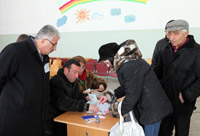The local government elections in 39 communities of Armenia on February 12 seem to have passed in quiet and normal environment.
There were no shootings, fighting, noisy violations and complaints as usually it happens after elections in Armenia. All eyes were on the mayoral elections of Hrazdan, where the main competitors were RPA member Aram Danielyan and former political prisoner Sasun Mikayelyan, who was supported by all parliamentarian and other opposition powers. In 31 precincts out of the 39 the elected candidates were supported by the RPA. Only in two communities in Kotayk region representatives of the PA party were elected. This region is under the influence of the PA’s chairman Gagik Tsarukyan, where usually high positions are occupied by his loyalists. Six community heads elected on Sunday were nonpartisan. This means that in these elections the RPA had 80% victory. Furthermore, the mentioned six nonpartisan candidates can be considered loyalists of the RPA too because soon or later they will be recruited in the RPA due to different tools and mechanisms the RPA has.
Can these elections be considered fair, or as the CEC chairman Tigran Mukuchyan said, one step better than the previous elections? Of course no. For example, observers from opposition powers have witnessed a number of violations in Hrazdan such as wet stamps in a number of polling stations, which means that the stamps had been used. There were cases when one voter was given two ballots. There were too many cases when voters said they did not see well and some people escorted them to the voting booths and “helped” them to vote. This seems to be a new method of electoral violation for Armenia. In a polling station the representatives of Heritage party found signs in front of the names of undecided voters writing that they needed help to make a decision who to vote for, the ballot slabs were not consistent with the ballots, etc. But these are separate shortcomings that eventually cannot change the results of the elections. These elections were mainly manipulated due to use of administrative resources and electoral bribe. Sasun Mikayelyan’s opponent won the election with 1573 more votes (13.075).
It was not a surprise that the authorities would try to organize “fair” elections by using administrative resources. Before the elections the pro-government parties announced for many times that they would organize fair elections and their parties had the necessary potential and capacity to win the elections. The pre-election headquarters of the RPA party in the regions are governed by the heads of the respective communities, who usually use their human and administrative resources to direct the elections. In the current situation in Armenia it is possible to collect many votes due to petitioning officials, threatening, encouraging and using administrative resources. Sasun Mikayelyan’s proxies say that electoral bribe was given to voters and after voting many voters entered the building of the local community service office to report that they had voted. The situation is like people are even afraid to refuse to take electoral bribe. This is better organized in villages. Many experienced representatives of the Heritage, Free Democrats parties served as Sasun Mikayelyan’s proxies in 26 polling stations in Hrazdan and they were not able to resist the power of administrative resources that supported the other candidate. Alexander Arzumanyan, who is a member of the Free Democrats party and used to serve as the head of Levon Ter-Petrosyan’s pre-election headquarter in 2008 was Sasun Mikayelyan’s proxy in a polling station in Hrazdan too. He says that inside the polling stations everything was quiet and it seemed that there were no violations. However, he assures that the entire administrative resources were used. He assures that in the polling station where he served as a proxy 463 people voted for the pro-government candidate and it was evident that his supporters had worked with them individually and they were separately brought to the polling station. Before the elections their team used the method of grouping by 10 or 100 people, according to which before the elections the coordinators of such groups made lists of 10 or 100 people committing to vote for their candidate and made sure they would vote on the voting day. There two types of voters in this group – those who were bribed and those who had jobs and were dependent.
Experts say that this was the opening of the parliamentary elections, i.e. the same developed mechanisms of violations will be used during the parliamentary elections as well to win and demonstrate that the elections are “fair and transparent”. On February 12 the ANC published an announcement concerning the municipal elections. “Again the authorities stole the elections, marred the free will of the people and failed the promises for organizing free and fair elections. The authorities show one more time that they are not even able to respect the excellent provisions of the electoral code adopted by them whenever there is a real alternative to the reproduction of their power,” writes the opposition ANC’s announcement.

